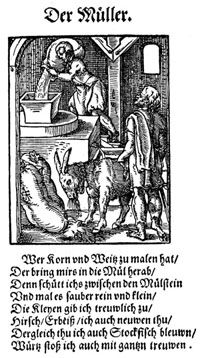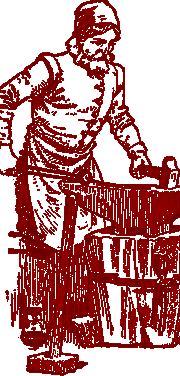 The miller was often known as a rogue or cheat, although at the same time he was the center of communities and a necessary member of early towns. While actual millers very often served as town politicians or sometimes even mayors, and the ubiquity of the surname Miller/Mueller/Molendino shows how common they were, the most frequent image of the miller in literature was that of the cheat.
The miller was often known as a rogue or cheat, although at the same time he was the center of communities and a necessary member of early towns. While actual millers very often served as town politicians or sometimes even mayors, and the ubiquity of the surname Miller/Mueller/Molendino shows how common they were, the most frequent image of the miller in literature was that of the cheat.
 The German Miller on the Eve of Colonial America
 The miller was often known as a rogue or cheat, although at the same time he was the center of communities and a necessary member of early towns. While actual millers very often served as town politicians or sometimes even mayors, and the ubiquity of the surname Miller/Mueller/Molendino shows how common they were, the most frequent image of the miller in literature was that of the cheat.
The miller was often known as a rogue or cheat, although at the same time he was the center of communities and a necessary member of early towns. While actual millers very often served as town politicians or sometimes even mayors, and the ubiquity of the surname Miller/Mueller/Molendino shows how common they were, the most frequent image of the miller in literature was that of the cheat.
In 1565, Jopst Amman published his Book of Trades (Ständebuch) which illustrated dozens of professions, each with a 8-line poem describing them. The miller (Der Müller) is no exception and Amman seems to go out of his way to take the miller's side. The poem reads:
Wer korn und Weiss zu mallen hat,
Der bringt mirs in die Mül herab, Denn schütt ichs zwischen den Mülstein Und mal es sauber rein und klein. Die Klenen gib ich treuwlich zu, Hirsch, Erbeiss, ich auch neuwen thu, Dergleich thu ich auch Stockfisch bleuwn, Würtz stoss ich auch mit ganzen treuwen. Whoever has grain and wheat to mill, He brings it to me at the mill, Then I pour it between the millstone And mill it clean, pure and fine. The gluten I faithfully throw in, Millet, peas, I also grind, Like that I also mash dried cod, Herbs I also pound with complete honesty.
Although all of the Standebuch engravings praise their respective professions in order to portray sixteenth century tradesmen in the best light possible, this poem also reminds us of some neglected elements of the milling profession.
The opening two lines remind us that the farmers had to bring their product to the mill which could sometimes be a considerable distance from the farms. In some cases, lords tried to enforce laws that the serfs had to bring their grain to the mill and enforced it by confiscating or destroying any small hand mills the farmers might try to keep. Mills of course had to be on rivers and since they were only profitable if they kept busy much of the time, they were not often too close to one another. An upland farmer might be fortunate to have a mill within a few miles, but in some areas the nearest mill could be 10 or more miles away (another reason they favored handmills for household consumption). In any case, given that there were also frequently queues of farmers waiting for their grain to be milled at the mill, the farmer might have to wait hours or even overnight to get his grain ground. This explains partly why Amman's miller says that he grinds it with complete honesty, since the farmer really had no way to know whether the bushel he came in with was entirely ground and returned to him as flour (less the miller's toll, or percentage, of course). This is also why Amman's miller 'faithfully' throws in the gluten rather that reserving this premium part of the wheat for himself, as he was so often accused of doing. (Of course the farmers often went off to the tavern while waiting for their flour, so their judgment upon returning may not have been perfectly trustworthy either).
The last three lines are most interesting from the fact that the foods being ground here are not what we would expect. We are familiar with the different types of grain such as wheat, buckwheat, barley, corn (maize), or oats being ground at the mill, but we often forget that flour can be made of legumes like dried peas or beans, and even dried fish could be made into a flour (once a fish was salted and dried, it was more palatable if ground and mixed with liquid and perhaps baked into cakes). And the final line reminds us that although we might buy very small amounts of ground dried herbs today, the farmers producing those herbs had very large quantities that they needed ground — a service the miller was only to happy to provide, and provide with, at least so he claimed, honesty and faithfulness.
Return to:
In-Depth Articles
 |
|

|